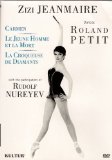 Zizi Jeanmarie Dance Roland Petit - Carmen/Le Jeune Homme Et La Mort/La Croqueuse De Diamants | DVD | (26/05/2008)
from £N/A
| Saving you £N/A (N/A%)
| RRP
Zizi Jeanmarie Dance Roland Petit - Carmen/Le Jeune Homme Et La Mort/La Croqueuse De Diamants | DVD | (26/05/2008)
from £N/A
| Saving you £N/A (N/A%)
| RRP 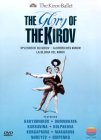 The Glory Of The Kirov Ballet | DVD | (02/04/2001)
from £18.64
| Saving you £-0.65 (N/A%)
| RRP
The Glory Of The Kirov Ballet | DVD | (02/04/2001)
from £18.64
| Saving you £-0.65 (N/A%)
| RRP The Glory of the Kirov assembles footage from a variety of Russian sources--some of it, including moments from the early careers of famous defectors such as Nureyev and Baryshnikov, was previously suppressed and thought lost. The Kirov Ballet and Opera of St. Petersburg, and their earlier incarnation as the Maryinsky, have always been the Bolshoi's principal Russian rival and an impressive nursery of talent. This profile includes silent footage of the Ballet Russe's Tamara Karsavina doing her barre exercises as well as a classic extract from Ulanova's White Swan pas de deux in the 1940s. The 1960s are heavily represented here with extracts from Glazunov's Raymonda and Khatchaturian's Spartacus as well as even more famous repertory such as Prokofiev's Romeo and Juliet and Petipa's choreography for Le Corsaire. There are also two versions of Fokine's Dying Swan, one from Olga Moiseyeva and a performance from Makarova whose sublimity almost makes us forget the tasteless arrangement of the Saint-Saens score for strings and Hollywood choir. This disc encapsulates the greatness of Russian ballet in its Soviet period as well as some of its lapses of taste. --Roz Kaveney
![Nureyev - Rudolf Nureyev [1991]](/pictures/1032819.jpg) Nureyev - Rudolf Nureyev | DVD | (25/09/2000)
from £N/A
| Saving you £N/A (N/A%)
| RRP
Nureyev - Rudolf Nureyev | DVD | (25/09/2000)
from £N/A
| Saving you £N/A (N/A%)
| RRP Patricia Foy's absorbing Rudolf Nureyev--A Documentary, a portrait of surely the most committed and versatile dancer in the history of ballet, was made in 1991, two years before his death. It is as much the study of a life apart as a profile of a tireless jet-setting artist. His career took him from poverty-stricken provincial childhood to life as a student at the Kirov, through defection to the West in 1961 and on to the great classical roles on the world's most famous stages, a sublime professional partnership with Margot Fonteyn and a fascinating evolution as a supreme exponent of modern dance. And through it all, Foy's film suggests that for all Nureyev's desire to be a member of the corps, he always felt isolated. The dancer himself concludes by saying he never felt a part of society. This would be all too melancholy but for the rich cast of assembled contributors who shed light on his mercurial character and artistic intelligence, and the unexpected charm of a man often tagged "difficult" in the wretched tradition of show business cliché. Best of all, though, is the extended archive footage, which testifies to his extraordinarily athleticism and sheer grace. Never has the human form looked so fluid in motion. --Piers Ford
 Dancing Through The Darkness | DVD | (15/11/2004)
from £29.99
| Saving you £-12.00 (N/A%)
| RRP
Dancing Through The Darkness | DVD | (15/11/2004)
from £29.99
| Saving you £-12.00 (N/A%)
| RRP This stunningly photographed and highly acclaimed film traces the last 10 years in the life of the legendary dancer Rudolph Nuryev one of the most impoprtant artistic figures of the 20th century. Through the testimony of those that were closest to him 'Dancing Through The Dark' tells the compelling story: starting with his controversial appointment in 1983 to restore the decaying Paris Opera Ballet followed by the terrible news that he was HIV positive right through to his death in 1983. During his silent fight with this horrific disease Nureyev suffered much but continued to work right up until his death. This is a documentary about the power of one man's creative vision a genius trapped in a dying body a film about sex lies bitter jealousy and money. Above all it shows one man's struggle with morality a man who literally tried to cheat death by doing what he loved.
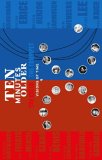 Ten Minutes Older - The Trumpet / The Cello | DVD | (12/09/2005)
from £N/A
| Saving you £N/A (N/A%)
| RRP
Ten Minutes Older - The Trumpet / The Cello | DVD | (12/09/2005)
from £N/A
| Saving you £N/A (N/A%)
| RRP Unique in the history of cinema about the most universal of all subjects:Time. Each of the 15 directors has been given exactly ten minutes on the screen for their vision. With complete creative freedom the directors bring their own unique interpretation of 'time' to the screen. Ten Minutes Older takes in all human experience: birth death love the drama of the moment history and ancient myth; and a great variety of locations all over the world. Combined together in two compilat
![Auber: Marco Spada [DVD] [2009] [US Import]](/pictures/1167970.jpg) Auber: Marco Spada | DVD | (25/09/2009)
from £N/A
| Saving you £N/A (N/A%)
| RRP
Auber: Marco Spada | DVD | (25/09/2009)
from £N/A
| Saving you £N/A (N/A%)
| RRP ![Monteverdi: Il Ritorno d'Ulisse in Patria -- Zurich/Harnoncourt [2002]](/pictures/1028406.jpg) Monteverdi: Il Ritorno d'Ulisse in Patria -- Zurich/Harnoncourt | DVD | (10/01/2003)
from £N/A
| Saving you £N/A (N/A%)
| RRP
Monteverdi: Il Ritorno d'Ulisse in Patria -- Zurich/Harnoncourt | DVD | (10/01/2003)
from £N/A
| Saving you £N/A (N/A%)
| RRP Klaus-Michael Gruber's austere staging of Monteverdi's Il Ritorno d'Ulisse in Patria ("Ulysses' Return") gives the impression of a sun-drenched ancient Greek island by the simplest of means: a bleached white wall against a dazzling sky-blue backcloth. It is an ideal setting for conductor Nikolaus Harnoncourt's pared-down reading of the score (fewer "authentic" rasps and rattles than 25 years ago) and Vesselina Kasarova's intense, restrained performance of Penelope, all the more powerful for being held back. For example, her repeated cry of "Torna!" ("Return to me!")--an excuse for much hand-wringing on the part of some mezzos--rarely rises above mezzo-forte here. Dietrich Henschel is equally impressive as Ulisse, and uses his rich, flexible voice with inventiveness: he handles the moment of recognition with his son Telemaco (the outrageously handsome Jonas Kaufmann) beautifully. There are some off-the-rail moments to the staging which might not appeal to English theatrical tastes: Penelope's suitors are presented in a rather silly puppet show and the comedy scenes with Iro (Rudolf Schasching) fall flat. But it doesn't prevent the final moments of reconciliation and recognition reaching powerful heights. On the DVD: Il Ritorno d'Ulisse in Patria is presented in 16:9 ratio and has PCM Stereo or Dolby Digital 5.1 sound options. There are subtitles in Italian, German, English, French and Spanish. A handsome, well-lit production is rendered on the small screen with as much subtle shading as possible by video director Felix Breisach, and falls very easily on the eye. --Warwick Thompson
![The Nutcracker [1968]](/pictures/1028547.jpg) The Nutcracker | DVD | (22/04/2002)
from £N/A
| Saving you £N/A (N/A%)
| RRP
The Nutcracker | DVD | (22/04/2002)
from £N/A
| Saving you £N/A (N/A%)
| RRP A 1968 made for television version of The Nutcracker performed at the Royal Opera House Covent Garden choreographed and produced by as well as starring Rudolf Nureyev and the Royal Ballet. Music by Tchaikovsky.
![Dust [2001]](/pictures/1021776.jpg) Dust | DVD | (21/06/2004)
from £N/A
| Saving you £N/A (N/A%)
| RRP
Dust | DVD | (21/06/2004)
from £N/A
| Saving you £N/A (N/A%)
| RRP Three Londoners head off into the depths of the English countryside to share some Christmas cheer but posh soap star Julian (Cole) tabloid journalist Jade (Brand) and Latino shag monster Carlos (Rudolf) get more than they bargained for when their Yuletide trip becomes a drug fuelled orgy of violent horror! As lusty farm girl Sam (Page 3 model Jodie Shaw) loses her mind on Angel Dust all hell breaks loose when her inbred pig farmer family take their savage revenge...
![Dancer's Dream - The Great Ballets Of Rudolf Nureyev / Romeo And Juliet [1999]](/pictures/1028339.jpg) Dancer's Dream - The Great Ballets Of Rudolf Nureyev / Romeo And Juliet | DVD | (07/07/2003)
from £20.00
| Saving you £4.99 (24.95%)
| RRP
Dancer's Dream - The Great Ballets Of Rudolf Nureyev / Romeo And Juliet | DVD | (07/07/2003)
from £20.00
| Saving you £4.99 (24.95%)
| RRP Rudolf Nureyev's 1984 production of Prokofiev's 'Romeo and Juliet' when he became director of the Paris Opera Ballet
![Wolfgang Amadeus Mozart - La Finta Giardiniera [2006]](/pictures/1049625.jpg) Wolfgang Amadeus Mozart - La Finta Giardiniera | DVD | (28/08/2006)
from £N/A
| Saving you £N/A (N/A%)
| RRP
Wolfgang Amadeus Mozart - La Finta Giardiniera | DVD | (28/08/2006)
from £N/A
| Saving you £N/A (N/A%)
| RRP Almost a quarter of a century ago Harnoncourt presented his reading of this rediscovered work on CD, but in this version from the Zurich Opera directed by well-known Austrian actor Tobias Moretti, the great Mozart magician conducted a staged production for the first time in an acclaimed production recorded live in February 2006. The Zurich Opera gathered a superb cast for this production: Italian soprano Eva Mei sings the Countess Violante, known as Sandrina, the feigned gardener of the title. Spanish soprano Isabel Rey is her opponent Arminda, and Arminda's former lover, the melancholy Cavaliere Ramiro, is sung by Romanian mezzo Liliana Nikiteanu.Moretti's staging presents the action in a modern villa in a hierarchal world of the rich and famous.
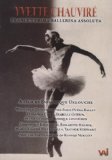 Yvette Chauvire: France's Prima Ballerina Assoluta | DVD | (26/07/2007)
from £16.10
| Saving you £2.89 (15.20%)
| RRP
Yvette Chauvire: France's Prima Ballerina Assoluta | DVD | (26/07/2007)
from £16.10
| Saving you £2.89 (15.20%)
| RRP ![Jacques Offenbach; Walter Felsenstein: Hoffmanns Erzählungen [Blu-ray] [2021]](/pictures/1156344.jpg) Jacques Offenbach; Walter Felsenstein: Hoffmanns Erzählungen | Blu Ray | (01/03/2021)
from £20.74
| Saving you £N/A (N/A%)
| RRP
Jacques Offenbach; Walter Felsenstein: Hoffmanns Erzählungen | Blu Ray | (01/03/2021)
from £20.74
| Saving you £N/A (N/A%)
| RRP  All-Star Tribute to Steinway | DVD | (23/05/2005)
from £4.01
| Saving you £20.24 (736.00%)
| RRP
All-Star Tribute to Steinway | DVD | (23/05/2005)
from £4.01
| Saving you £20.24 (736.00%)
| RRP An All-Star Tribute To Steinway
![Dvorak: Piano & Cello Concerto [1992]](/pictures/1070120.jpg) Dvorak: Piano & Cello Concerto | DVD | (26/02/2007)
from £21.82
| Saving you £3.17 (12.70%)
| RRP
Dvorak: Piano & Cello Concerto | DVD | (26/02/2007)
from £21.82
| Saving you £3.17 (12.70%)
| RRP ![Styx [2001]](/pictures/1002750.jpg) Styx | DVD | (10/03/2003)
from £N/A
| Saving you £N/A (N/A%)
| RRP
Styx | DVD | (10/03/2003)
from £N/A
| Saving you £N/A (N/A%)
| RRP Nelson Reedy is a safecracker - One of the best in the business but he's gone straight. That is until his kid brother Mike arrives desperate for money to pay off some heavies. Nelson has no choice but to do one last job - but it's with the man that almost cost him his life.
![Various Composers - the Art of the Pas De Deux [2006]](/pictures/1077480.jpg) Various Composers - the Art of the Pas De Deux | DVD | (12/06/2006)
from £21.05
| Saving you £1.94 (8.40%)
| RRP
Various Composers - the Art of the Pas De Deux | DVD | (12/06/2006)
from £21.05
| Saving you £1.94 (8.40%)
| RRP Various Composers - The Art Of The Pas De Deux
 Canary (Blu-ray) | Blu Ray | (26/08/2019)
from £17.45
| Saving you £N/A (N/A%)
| RRP
Canary (Blu-ray) | Blu Ray | (26/08/2019)
from £17.45
| Saving you £N/A (N/A%)
| RRP Drafted during Apartheid by the South African Army, Johan Niemand's love for Boy George and Depeche Mode lands him a spot in the SADF Choir - the 'Canaries.' In a landscape where law and religion oppress individuality, Johan and the Canaries have to survive military training and go on a nationwide tour. An unexpected romance on the battlefield forces Johan to reckon with his long-repressed sexual identity. This musical comedy revels in the discovery of finding your voice and learning to fly.
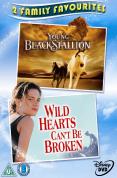 Young Black Stallion / Wild Hearts Can't Be Broken | DVD | (02/10/2006)
from £N/A
| Saving you £N/A (N/A%)
| RRP
Young Black Stallion / Wild Hearts Can't Be Broken | DVD | (02/10/2006)
from £N/A
| Saving you £N/A (N/A%)
| RRP Young Black Stallion: Created as an IMAX movie based on the novel by father/son team Walter and Steven Farley Disney's Young Black Stallion tells the story of a wild colt who befriends a young girl in the Arabian desert eventually becoming her equine soul mate and champion racehorse. Set in 1946 North Africa the story begins as Neera gets separated from her desert caravan by an ambush of soldiers. Alone and lost she discovers a colt among the drifts and in time they forge a friendship of interdependence. The spirited horse and child ride like the wind yet when they arrive home the colt bolts leaving Neera to convince her grandfather that the legendary stallion is more than a mirage. Ultimately she proves this in a climatic action sequence brimming with girl power. The cinematography dazzles with its large-format visuals and sweeping panoramas yet the 50-minute length truncates the story into a seemingly abridged version. An extra hour of plot and character development would have allowed it to venture closer to the magnificence of the original Stallion installment. Wild Hearts Can't Be Broken: The true story of heroine Sonora Webster a determined young rebel who leaves her backwoods home in Georgia and finds work with horses at a travelling stunt show. Her greatest wish is to become a 'diving girl' but a twist of fate threatens to destroy her dream...
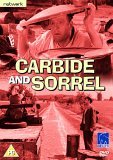 Corbide And Sorrel | DVD | (12/02/2007)
from £12.13
| Saving you £2.86 (19.10%)
| RRP
Corbide And Sorrel | DVD | (12/02/2007)
from £12.13
| Saving you £2.86 (19.10%)
| RRP In this free-spirited if not anarchic comedy by the director of Spur der Steine (Trace of Stones) workers in Dresden send a colleague hundreds of miles north to pick up welding supplies for their factory just at the end of World War II. His attempts to move the supplies through the Soviet occupation zone lead to an uproarious odyssey full of hijinks and misadventure.

Please wait. Loading...
This site uses cookies.
More details in our privacy policy